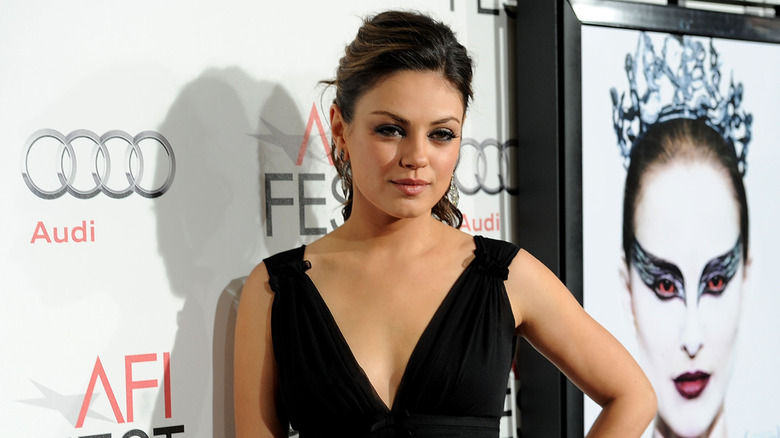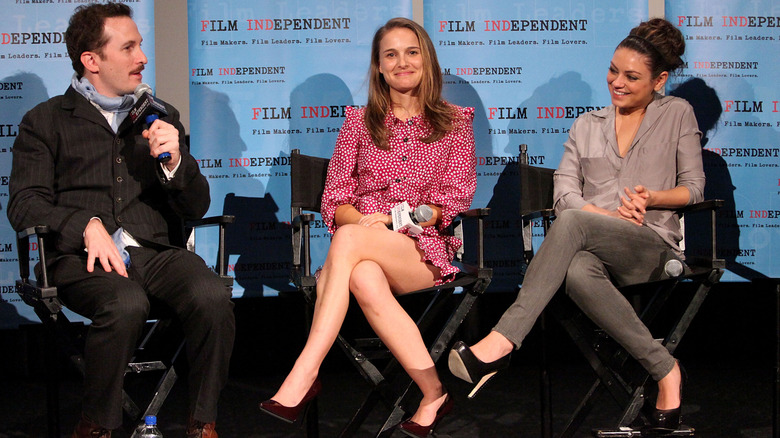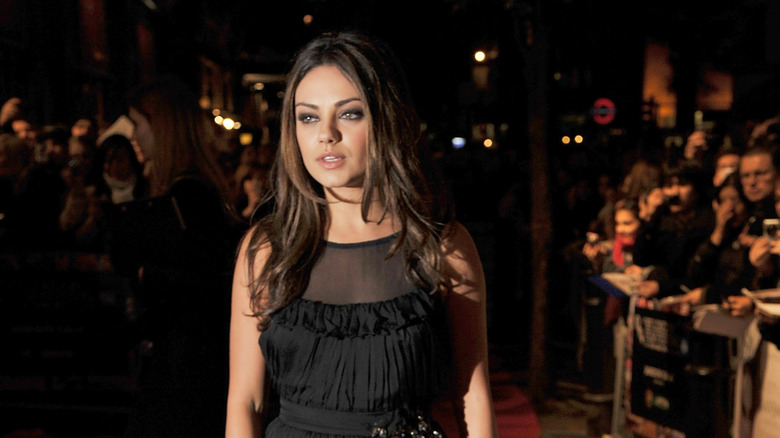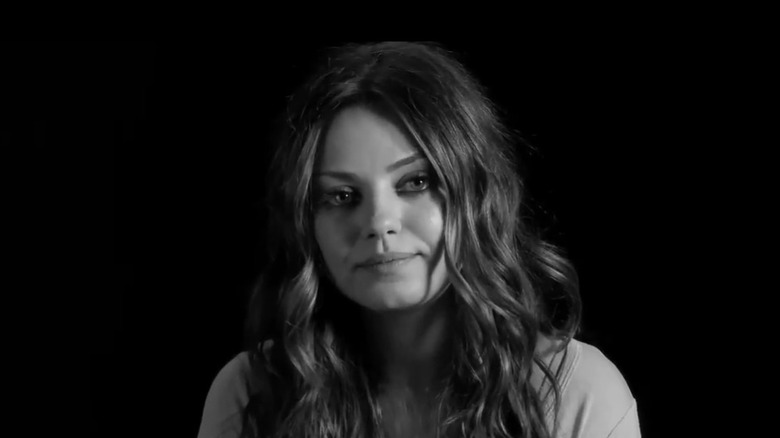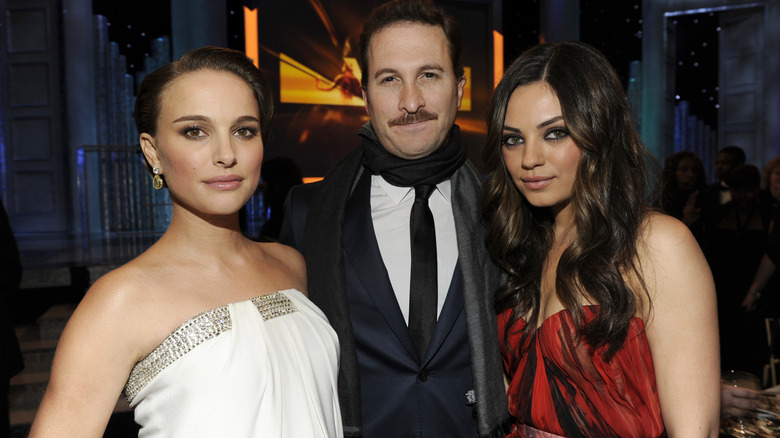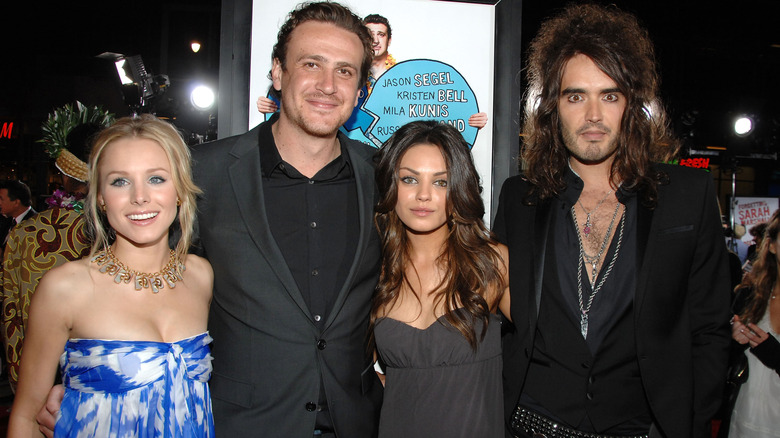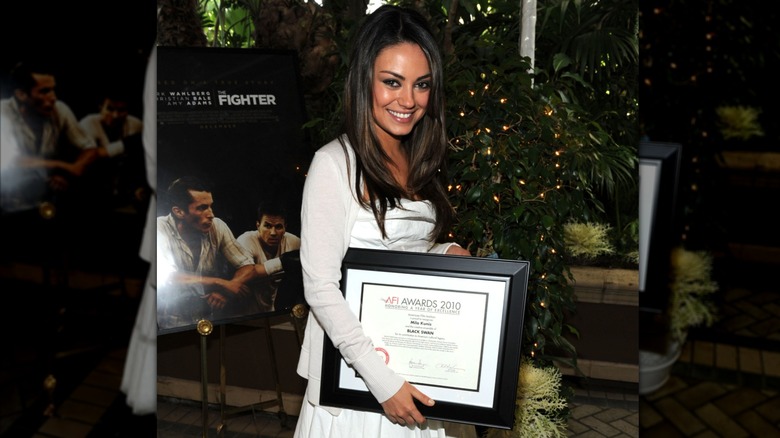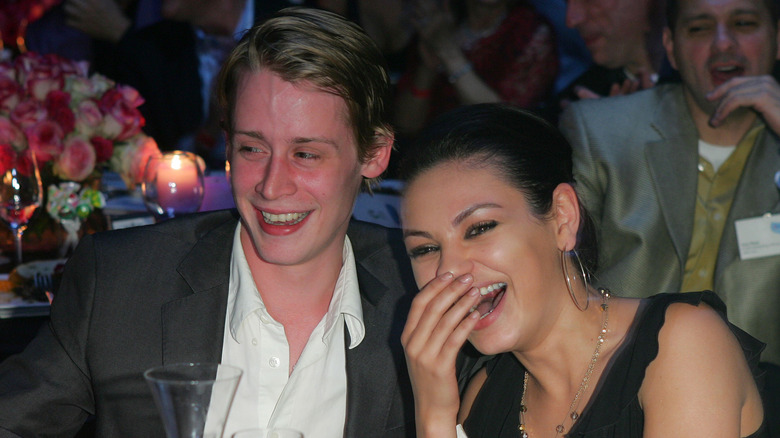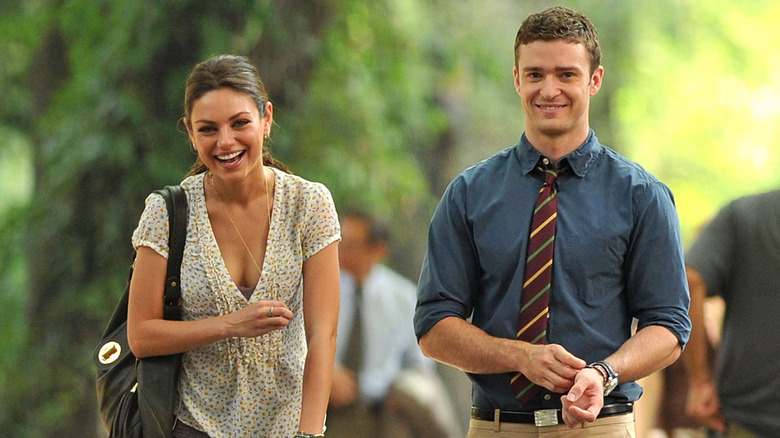Mila Kunis Was Never The Same After Black Swan
After kicking off her commercial acting career when she was still in grade school, Mila Kunis' career transformed when she landed the role of Jackie Burkhart on "That '70s Show." It wasn't long before she began voicing Meg Griffin on the long-running animated series "Family Guy," popping up in teen comedies like "Get Over It," and pivoting to rom-coms like "Forgetting Sarah Marshall." When she signed on for 2010's "Black Swan," a Darren Aronofsky-helmed thriller about ballerinas, it was an unexpected move.
In the psychological drama, Kunis played the role of Lily, the free-spirited rival to Natalie Portman's Nina. And while they might've been pitted against each other on the set, Portman played a crucial part in Kunis joining the cast. The two were friends long before they were in the movie together, and Portman had a lightbulb moment when they were out shopping together one day. "I remember being at the Rose Bowl Flea Market with [Kunis], talking about this ballet movie I was making with Darren. Mila said, 'I remember when I would take off my pointe shoes...," Portman recounted to Vogue in 2025. "I immediately called Darren and said there was this amazing actress with ballet experience who would be perfect for Lily." Alas, as Kunis clarified in that same interview, she did not actually have the experience Portman said she had. "I may have exaggerated on your behalf!" Portman replied.
That exaggeration helped change Kunis' career and her life. Without further ado, here are the reasons why she was never the same after "Black Swan."
Mila Kunis dedicated herself to extreme training
To play the role of a ballerina, Mila Kunis committed to an intense training regimen despite having next to no previous experience. As she quipped to Vogue in 2025, "I think I said, 'I danced once,' and that got twisted into me having taken pointe." In a separate interview with Vanity Fair, Kunis recalled jumping right into training. "I mean, mind you, Darren was like, and now you must learn to dance, and I was like, I can do it. Oh my God, I broke my body. I was like, no, I can't. But I did it, " she said.
Preparing for the role was no small feat. As Kunis recounted to W Magazine in 2011, she trained every single day over several months. "I had one day off on my birthday," she added. Though the days were long, Kunis was willing to transform herself completely for her craft. As she told Collider in 2010, "You can only fake so much physicality, so you have to immerse yourself in this world, in the way that somebody walks, talks and handles themselves." This drive set the stage for a performance that now defines her career.
While reflecting on the prep, Kunis said in Vogue, "We were only supposed to have three months of prep before filming started, but we lost some financing, so that got extended to six months while Darren tried to find money. It sucked for Darren, but Nat and I were so happy because we had three extra months to dance." Kunis also recalled that they would often "shoot those dancing scenes for hours." Her work ethic reflects how determined she was to do justice to her role.
The effects of Mila Kunis' diet lingered long after filming
The ballet bootcamp for "Black Swan" not only taught Mila Kunis how to play a dancer convincingly — it altered her body in ways that lasted long after filming was over. Kunis has described the extreme methods and lifestyle changes she made in order to achieve the stereotypical body type of a lifelong ballerina. As she told Vogue, "My prep was a lot of dancing and very little eating — which I know you're not supposed to say, but it's the truth. I drank a lot of broth and danced for 12 hours a day."
Kunis also began keeping tabs on her diet, which, as she explained on "The Howard Stern Show," was not something she'd ever done before. The actor relied on a food delivery service with very controlled portions. She added, "I'm not promoting this at all, but I used to be a smoker, and so I smoked a lot of cigarettes and I ate a limited amount of calories." She lost a significant amount of weight, and the process was a shock to her system. As she told Harper's Bazaar in 2012, "[My] body has never been the same. My shape is different. When I got down to 95 pounds, I was muscles, like a little brick house, but skin and bones. When I gained it back, it went to completely different areas."
Understandably, Kunis wasn't exactly raring to go through another round of demanding and intense physical changes after "Black Swan." That said, when Harper's Bazaar asked if she'd take another role requiring that kind of body transformation, she said she'd consider it.
The sitcom veteran sustained bruises and injuries
Mila Kunis' "Black Swan" journey was as painful as it was transformative. On top of the weight loss and extreme training, she had to deal with multiple injuries, some of which left lasting marks. In a 2011 interview with W Magazine, she opened up about the physical toll the role took: "I tore a ligament. I dislocated my shoulder. I have two scars on my back." The "That '70s Show" actor was determined to get the choreography just right and be convincing as a veteran ballerina, and her body paid the price.
Kunis was frequently lifted, spun, and dropped in scenes, and that was not easy on her body. "We would shoot those dancing scenes for hours, and I had bruises all over my ribs just from being lifted over and over again," she said in Vogue in 2025. "I also dislocated my shoulder pretty early in the production and thought I was completely screwed," she added, recalling her fear that a serious injury might get in the way of her work.
Rather than pause filming, director Darren Aronofsky found a way to keep things on track. "Darren sent me to an acupuncturist and I somehow came out totally fine," Kunis told Vogue, explaining that the treatment helped her get back to work quickly. Despite everything she went through physically, Kunis doesn't regret any of it. As she said in her aforementioned interview for W Magazine, "It was worth every minute."
Mila Kunis also pushed herself on an emotional level
In addition to the physical challenges that come with the role, "Black Swan" also tested Mila Kunis on an emotional level. The film's dark themes — obsession, competition, psychological breakdown, and so on — meant that filming could be mentally taxing. Director Darren Aronofsky admitted in Vogue's 15-year anniversary piece that there is "always a certain amount of suffering" in the kind of work he demands, even when it's just from the physical pain of training for a role.
That suffering extended to the film's guerrilla style of shooting, which often kept the cast on edge. Kunis recalled being woken up in the middle of the night with sudden instructions to meet Aronofsky in the city. "Darren would call me at two in the morning and say, 'Hey, can you get to the subway? We're going to shoot at 86th Street.' I didn't have kids so I was like, 'Sure, whatever.' A lot of times we'd show up to a street corner and shoot without a permit. I don't think any of that could happen today," she told Vogue.
Some moments were even more uncomfortable. Natalie Portman later acknowledged that filming the sex scene with Kunis was a little tricky. Given their long friendship history, they both felt awkward about it. "It's fun to work with your friend until you have to film a sex scene with them," Portman said in the aforementioned Vogue interview. Kunis laughed when reminded of it, confessing, "To tell you the truth, I completely forgot about that scene. I totally blocked that out." Together, their comments show how "Black Swan" didn't just test their physical resilience, but also pushed them out of their comfort zones.
She broke out of comedy typecasting
Before "Black Swan," Mila Kunis was primarily known for comedy and lighthearted roles. She spent eight seasons as Jackie Burkhart on "That '70s Show" and was known for films like "Forgetting Sarah Marshall" and "Date Night." She was often cast as the cute, witty girlfriend or the funny sidekick. Although these roles capitalized on her comedic timing and charm, they did not fully show her range. "Black Swan" changed that overnight. By taking on the role of Lily, Kunis broke free from the typecasting that had long defined her in Hollywood. She showed that she could handle darker, more complex roles.
When Kunis earned a Golden Globe nomination for "Black Swan," she explained what she learned while preparing for the role. "Going into the ballet world, I personally didn't know what to expect," she told HFPA reporters. "I found that they are the most competitive, most brutal group of ladies I've ever met in my life. Truly, they are ruthless. They are very judgmental of themselves and of one another. They are also very skinny and incredibly disciplined." Her words shed a light on the difference between the intense world of ballet and the lighter, humorous roles audiences were used to seeing her in.
Mila Kunis was in the award season conversation
"Black Swan" not only showed audiences another side of Mila Kunis' acting chops, but she gained a new kind of recognition from critics and award shows. While she was no stranger to racking up noms at the Teen Choice Awards thanks to her many years on "That '70s Show," the psychological drama ushered her into the world of prestige award shows. The film itself was a huge success. "Black Swan" scored five Oscar nominations, and Natalie Portman won Best Actress. When Collider asked Kunis about the Oscar buzz surrounding the movie before noms came out, she acknowledged that while it was exciting, she did feel a little out of her element. "It all makes me very uncomfortable," she said. "As long as people respond to the film, I'm not even going to touch upon awards because I can't."
While she didn't end up getting nominated for an Academy Award after all, Kunis did gain recognition with a Golden Globe nomination for Best Supporting Actress and two Screen Actors Guild Awards nominations. Furthermore, Kunis received the Year of Excellence award at the AFI Awards for her performance in the ballet horror flick.
At the Venice Film Festival, where "Black Swan" premiered, Kunis was honored with the Marcello Mastroianni Award for Best Young Actor or Actress. "After I did the movie there was radio silence, then I suddenly got a call from my manager, saying I'd won a prize at Venice. I made Black Swan thinking it'd be an amazing little indie that a few people would see," Kunis told Vogue years later. " The whole thing went from zero to 100, and then it just kept snowballing into this phenomenon."
The rom-com alum faced heartbreak behind the scenes
The release of "Black Swan" marked a huge turning point in Mila Kunis' career and personal life. About a month after the film hit theaters, Kunis' representative confirmed to Page Six that she and Macaulay Culkin had ended their long-term relationship after eight years together. Around when she was being praised for her most serious role yet, she was also quietly going through a major breakup behind the scenes.
At the time, both actors stayed mostly silent about why things ended. Page Six speculated that the attention Kunis was getting from Black Swan may have played a part, though that was never confirmed. Years later, Kunis opened up about her and Culkin's split on Dax Shepard's "Armchair Expert" podcast. She called it a "horrible breakup," saying plainly, "I f***ed up." She went on to say, "I was an a***hole in my 20s," and acknowledged that it took a long time for her to come to terms with her mistakes.
Though painful, that chapter closed as her career took off. Not long after, Kunis eventually reconnected with her former "That '70s Show" co-star Ashton Kutcher, who later became her husband.
The film's enduring impact on Mila Kunis' career
In her 2011 interview with W Magazine, Mila Kunis didn't sugarcoat the work that went into "Black Swan." "It was the hardest thing I've ever done," she stated. That hard work continues to pay off: To this day, it's considered Kunis' finest performance by many critics and fans alike.
After "Black Swan," Mila Kunis began landing lead roles in major movies across different genres. In 2011, she starred in "Friends with Benefits" alongside Justin Timberlake. The next year, she teamed up with Mark Wahlberg in Seth MacFarlane's comedy "Ted," which turned into a huge box office hit. In 2013, she even stepped into the world of fantasy, playing the Wicked Witch in Sam Raimi's "Oz: The Great and Powerful." At the same time, she appeared in more serious projects, including "Blood Ties," "The Angriest Man in Brooklyn," and "Four Good Days." Roles like these might not have been offered to her before "Black Swan," but it seems safe to say that her work in that flick opened new doors and made filmmakers — and audiences — see her in a new light.
In addition to acting, Kunis also expanded into producing. She launched her own production company, Orchard Farm Productions, and has worked to create more female-driven projects. This move gave her more control over her career and showed her growth in the industry after years in front of the camera.
